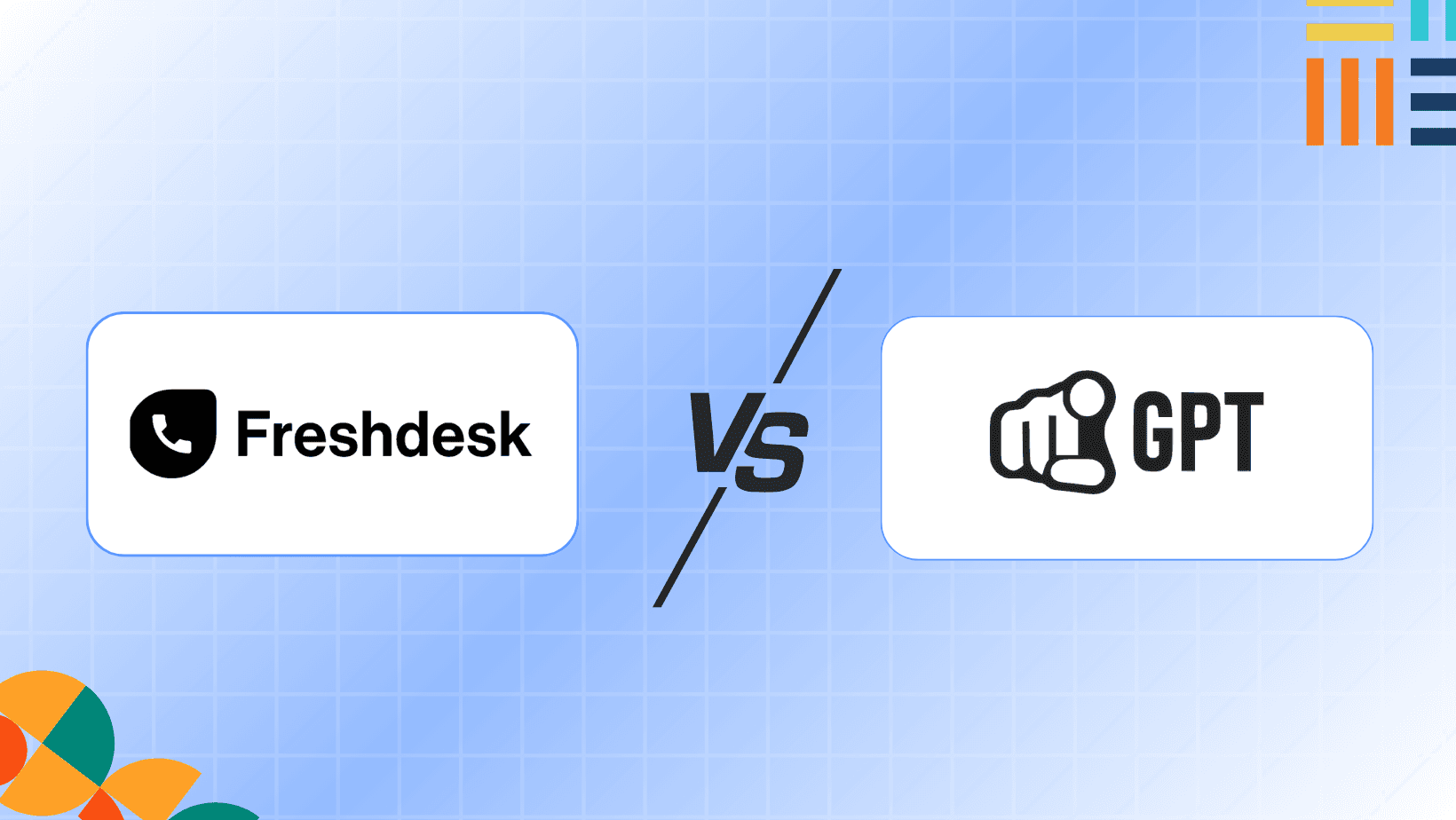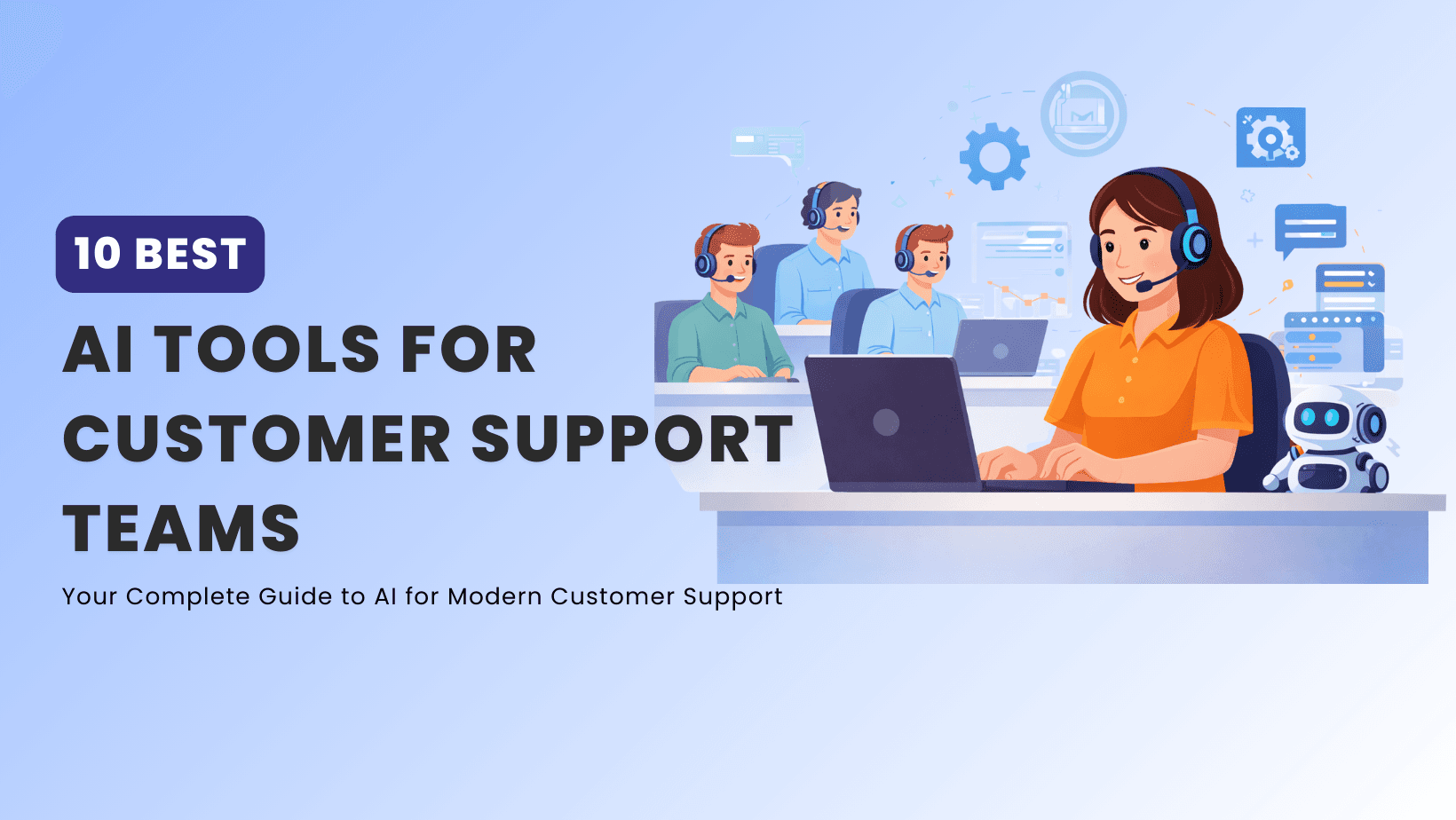6 Best AI Agents for Ecommerce in 2026: Complete Comparison Guide
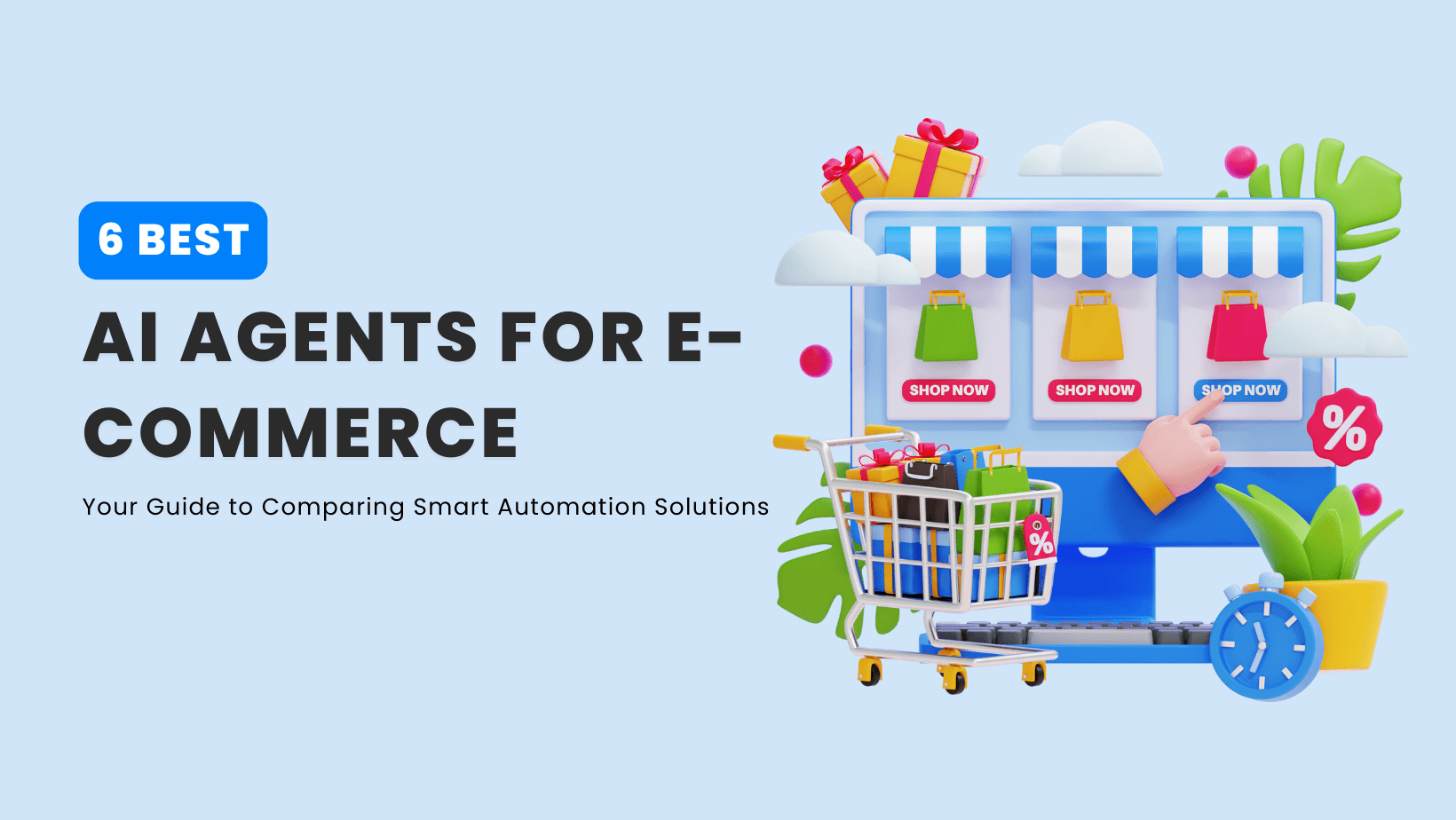
Ecommerce in 2026 is thriving. Online stores are serving global customers, selling across multiple channels, and offering highly personalized shopping experiences. A big part of this progress comes from AI agents.
These intelligent assistants are changing how businesses connect with shoppers. They can answer questions instantly, recommend products based on behavior, track orders in real time, and manage conversations on platforms like WhatsApp, Instagram, and Messenger. For ecommerce brands, AI agents make it possible to scale customer support and sales without slowing down.
In this blog, we’ll look at the six best AI agents for ecommerce in 2026, highlighting their features, advantages, and where they fit best for different types of online stores.
Why AI Agents Are Essential for Ecommerce Success in 2026
According to a 2024 Gartner report, 80% of customer service organizations will use AI by 2026, up from 47% in 2023.
The AI shift is no longer an optional add-on for ecommerce businesses. They are becoming a core part of how online stores deliver customer service, drive sales, and operate at scale. Here are the main reasons why brands are adopting them in 2026:
- Always available support: Customers expect immediate answers, and AI agents provide reliable assistance around the clock without delays.
- Lower operational costs: A single AI agent can manage thousands of conversations simultaneously, reducing the need for large human support teams.
- Personalized shopping experiences: Nearly 40% of shoppers are more likely to complete a purchase after a tailored AI interaction that recommends relevant products or answers specific questions.
- Revenue Growth: AI-driven personalization increases conversion rates by 10-15%, with companies excelling at AI personalization generating 30% more revenue than competitors. Smart product recommendations powered by AI can triple revenue and more than double conversion rates.
- Global accessibility: More than 75% of buyers prefer to shop in their native language. Multilingual AI agents help stores connect with customers worldwide without language barriers.
- Consistent brand experience: AI agents powered by natural language processing maintain the same tone, style, and accuracy in every interaction, building stronger trust and brand loyalty.
For ecommerce businesses, these benefits translate into higher customer satisfaction, improved conversion rates, and the ability to scale efficiently while keeping costs under control.
Best Ecommerce AI Agents: Quick Overview and Comparison
Choosing the right AI agent can transform how your store handles customer support and sales. Here’s a quick look at the top platforms and what makes each one stand out in 2026.
- YourGPT: The best complete AI suite that helps businesses with customer support, sales, and business operations.
- Gorgias: Shopify-focused AI support platform that automates ticketing and customer replies.
- HubSpot: CRM-powered AI workflows for aligning sales, marketing, and support.
- Intercom (Fin): Enterprise-ready AI with advanced automation and customer journey insights.
- ProProfs Desk: Affordable AI helpdesk with simple ticketing and collaboration features.
- ManyChat: Social-first AI tool that drives sales on Instagram, Facebook, and WhatsApp.
Top 7 Ecommerce AI Agents: Features, Pricing & Best Use Cases
Here is the list of top ecommerce AI agents with their features, pricing, pros, and cons:
1. YourGPT

YourGPT is a no code complete AI platform that helps businesses with customer support, sales, and business operations. Designed for ecommerce brands that want one powerful AI-first system, it allows businesses to train AI agents on their own data, including websites, PDFs, Notion docs, and Google Sheets. This ensures answers are accurate, personalized, and context-aware.
Features:
- Train on Your Data: A no-code builder lets you train the AI on your product catalogs, return policies, and brand voice for accurate, on-brand answers.
- True Omnichannel Support: Manages conversations from your website, WhatsApp, Instagram, Messenger, and even voice AI for phone calls, all in one place.
- Automate Ecommerce Tasks: Moves beyond simple questions to automate order lookups (WISMO), process returns, and check refund status by connecting directly to your store.
- AI Workflow Studio: To automate complex processes like managing subscriptions, processing exchanges, or escalating high-value customers.
- Seamless Agent Handoff: Intelligently escalates complex issues or VIP customers to your human team directly in the tools they already use, like Slack, email, or a central dashboard.
- Deep Ecommerce Integrations: Connects natively with Shopify, WooCommerce, and custom APIs to pull order data, check inventory, and update customer profiles in real-time.
Pros
- Combines support, sales, and marketing automation in one platform
- Delivers consistent experiences across multiple ecommerce channels
- Customizable without technical expertise
Cons
- May feel feature-heavy for stores that only need simple automation
Best For
- Ecommerce businesses that want advanced AI agent to scale customer interactions, improve efficiency, and boost sales.
2. Gorgias

Gorgias is a customer support platform built specifically for ecommerce. It integrates deeply with Shopify, Magento, and BigCommerce, making it a favorite among online stores. With AI-powered automation, it helps merchants respond faster, reduce repetitive work, and deliver more personalized customer experiences.
Features
- AI-driven response suggestions for faster replies
- Automated tagging and intent detection
- Native integrations with Shopify, Magento, and BigCommerce
- Multi-channel support across email, chat, and social media
- Centralized dashboard for managing all customer requests
Pros
- Tailored specifically for ecommerce businesses
- Strong Shopify and Magento integrations
- Easy to set up and use
Cons
- Reporting and analytics are more limited compared to enterprise tools
Best For
- Shopify and Magento merchants that want ecommerce-focused AI support with built-in automation.
3. HubSpot
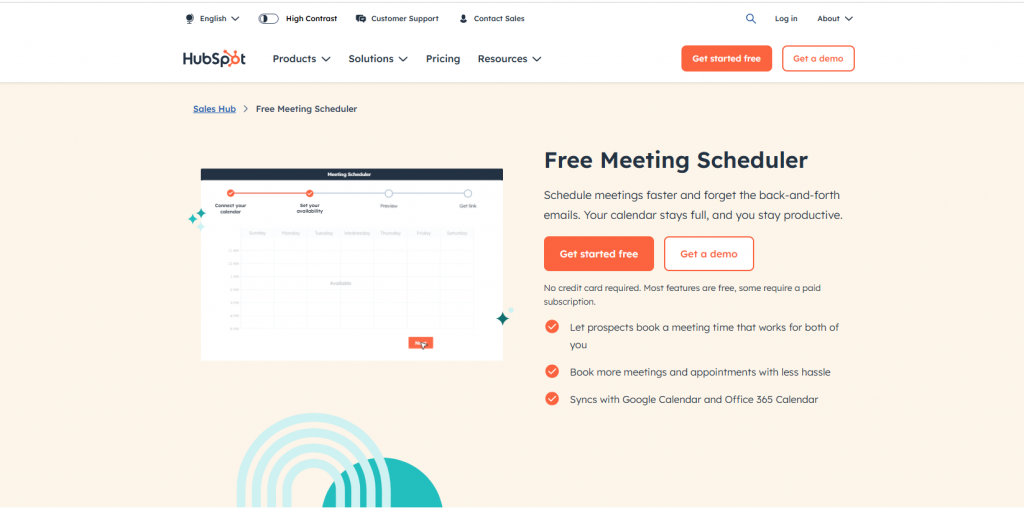
HubSpot combines CRM with AI-driven automation, making it an excellent choice for ecommerce stores that want to align sales, marketing, and support in one system. Its AI agents use customer data from the CRM to deliver consistent, personalized responses and improve the overall shopping experience.
Features
- AI workflows across sales, marketing, and support
- Unified inbox with intelligent message routing
- CRM-backed automation for ecommerce customer journeys
- Knowledge base and ticket automation for faster resolutions
Pros
- Centralized system for all customer-facing teams
- Robust analytics and reporting capabilities
- Free plan available for smaller businesses
Cons
- Requires CRM setup and configuration for best results
Best For
- Ecommerce businesses that want AI support tightly integrated with CRM data to unify customer engagement.
4. Intercom (Fin)

Intercom’s Fin AI agent is built for ecommerce brands that need advanced workflows and enterprise-level automation. It combines powerful AI with strong analytics to help businesses engage shoppers in real time, guide them through the buying journey, and optimize support operations.
Features
- AI-powered surveys and workflow automation
- Intelligent conversation routing for faster resolutions
- Multichannel support across web, mobile apps, and social platforms
- Detailed reporting and performance analytics
Pros
- Enterprise-ready features for scaling businesses
- Data-driven insights and tracking
- Prebuilt templates that accelerate deployment
Cons
- Higher pricing than many alternatives
- Requires onboarding and training for best use
Best For
- Growing ecommerce stores that need advanced AI automation, customer insights, and enterprise-level scalability.
5. ProProfs Desk
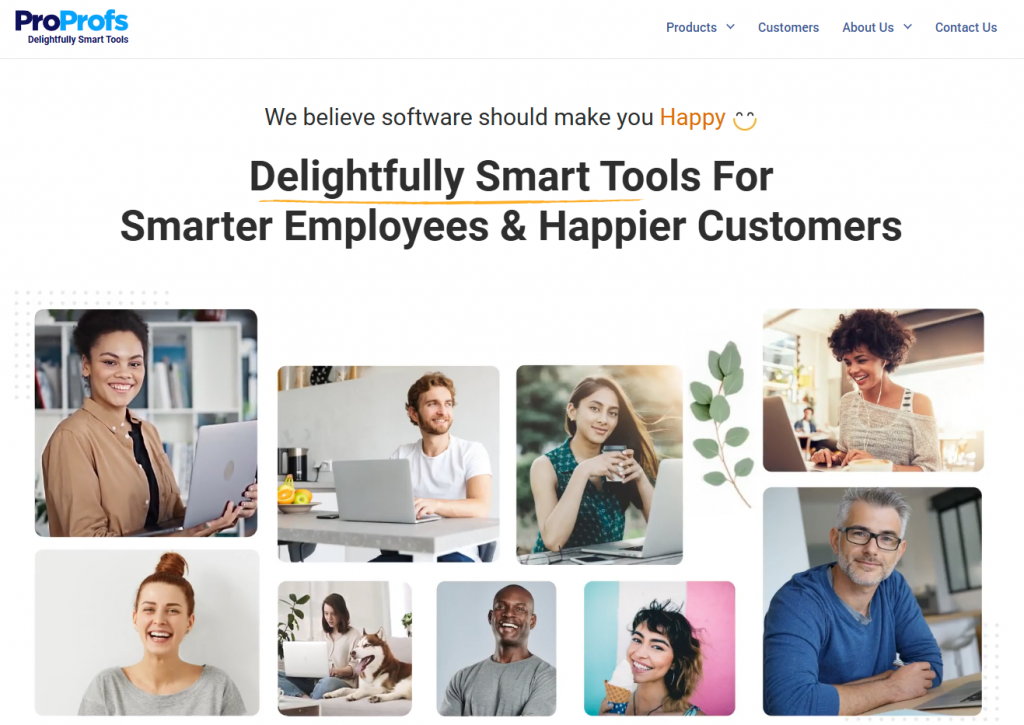
ProProfs Desk is a lightweight cloud-based helpdesk that leverages AI to simplify ticket management and customer interactions. With its affordability and ease of use, it is a strong choice for small ecommerce teams that want to improve efficiency without adding complexity.
Key Features
- AI-suggested responses to speed up replies
- Shared inbox for team collaboration
- Automated issue tracking and resolution workflows
- Basic ecommerce integrations for online stores
Pros
- Affordable pricing suited for small teams
- Simple and quick to set up
- Reliable for managing day-to-day customer requests
Cons
- Limited advanced AI functionality compared to larger platforms
Best For
- Smaller ecommerce businesses that want budget-friendly AI ticketing and collaboration tools.
6. ManyChat

ManyChat is a leading platform for social commerce that helps ecommerce stores engage with shoppers directly on Instagram, Facebook, and WhatsApp. By turning conversations into conversions, it allows businesses to automate cart recovery, order tracking, and personalized promotions across social channels.
Key Features
- Prebuilt templates for cart recovery, order updates, and promotions
- Social-first automation across Instagram, Facebook, and WhatsApp
- Integrations with Shopify, WooCommerce, and Zapier
- Multi-language support for global audiences
Pros
- Excellent for social-first selling strategies
- Easy-to-use drag-and-drop builder
- Affordable pricing with a free tier available
Cons
- Limited functionality outside of social media channels
Best For
- Ecommerce brands that sell heavily through Instagram, Facebook, and WhatsApp, and want to increase conversions through conversational selling.
AI Agent Comparison: Features, Pricing & Channel Support at a Glance
Here’s a side-by-side look at the best ecommerce AI agents in 2026, including what they are best for, whether a free plan is available, and which channels they support.
| Platform | Best For | Key Strengths | Channels Supported | Setup Complexity | Ecommerce Integrations |
|---|---|---|---|---|---|
| YourGPT | Complete AI Platform for support, sales, and Ecommerce operations | Omnichannel deployment + Voice AI + No-code builder + Custom training on business data | Web, WhatsApp, Messenger, Telegram, LINE, Voice/Phone, Email, Slack | ⭐ Easy (No-code platform) |
Shopify, WooCommerce, Custom APIs, Zapier |
| Gorgias | Shopify & Magento stores with high ticket volume | Deep Shopify integration + Ticket-based automation + Ecommerce-specific features | Email, Live Chat, SMS, Social Media (FB, Instagram) | ⭐ Easy | Shopify (native), Magento, BigCommerce |
| HubSpot (Breeze) | Businesses needing unified CRM + AI automation across sales & marketing | CRM-powered personalization + Marketing automation + Unified customer data + AI Agents (Breeze) | Email, Web Chat, Social Media, WhatsApp | ⭐⭐ Moderate (CRM setup required) |
Shopify, WooCommerce, Zapier, 1,800+ apps |
| Intercom (Fin AI) | Enterprise brands with complex workflows & high support volume | Advanced analytics + AI workflow automation + 51-65% resolution rate + Outcome-based pricing | Web, Mobile Apps, Email, Social Media, SMS | ⭐⭐⭐ Complex (Onboarding required) |
Shopify, Zendesk, Salesforce, HubSpot (via API) |
| ProProfs Desk | Small teams with basic support needs on a budget | Budget-friendly + Simple ticketing + Shared inbox + Basic automation | Email, Live Chat, Social Media (basic) | ⭐ Easy | Basic ecommerce plugins, Limited integrations |
| ManyChat | Social commerce & Instagram/Facebook sellers | Social-first automation + Cart recovery + Instagram DM automation + Growth tools | Facebook Messenger, Instagram, WhatsApp, SMS, Email, Telegram | ⭐ Easy (Drag-and-drop) |
Shopify, WooCommerce, HubSpot, Zapier |
| Botpress | Developers needing custom AI workflows & deep customization | Open-source flexibility + Custom AI agents + Multiple LLM support + Developer-friendly SDK | Web, WhatsApp, Facebook, Telegram, Slack, Microsoft Teams, Custom channels | ⭐⭐⭐ Complex (Coding knowledge helpful) |
Shopify, WooCommerce, Zendesk, Salesforce, Custom APIs |
How to Choose the Right AI Agent: 6 Factors for Ecommerce Success
Picking the wrong AI agent wastes money and time. Here’s what actually matters when choosing one for your store.
1. Store Size and Order Volume
Your monthly order volume determines what you need. If you’re processing under 500 orders monthly, you’re probably dealing with 200-400 support tickets. Basic automation that answers shipping and return questions works fine here.
Between 500-2,000 orders, you’re likely spending 15-25 hours per week on support. That’s real money. An AI agent that handles half your tickets can save $1,200-2,400 monthly in labor costs alone.
Once you hit 2,000+ orders monthly, you’re looking at enterprise-level needs. At 5,000+ tickets per month, a $2,000 monthly AI investment pays for itself by replacing 2-3 full-time support staff.
Quick calculation: divide your total monthly support hours by your ticket count, then multiply by your hourly rate. If you’re spending more than $3-5 per ticket, automation will pay for itself fast.
2. Where Your Customers Actually Talk to You
This matters more than most people realize. If 30% of your sales come through Instagram and Facebook, you need tools built for social commerce. Comment-to-DM automation and cart recovery flows on social platforms can increase conversion rates by 7x compared to slow email responses.
Running traditional support through email and live chat? You need proper ticket routing and shared inbox features. If customers reach you across five or more channels, you’ll need something that brings everything into one place. Missing messages because they’re scattered across platforms costs sales.
3. Your Team’s Technical Skills
Be honest about this. If nobody on your team codes, pick something with a visual builder and templates. Setup should take hours, not weeks.
Have a developer available part-time? You can handle API connections to your store but still need an interface that your support team can manage daily without constantly asking for help.
Got dedicated developers? Open-source or highly customizable platforms let you build exactly what you need. Just remember that “cheaper” platforms can cost $5,000-15,000 in developer time to actually implement and maintain.
4. Budget Reality Check
Under $50 monthly gets you basic FAQ automation on one or two channels. Good for testing, not much else.
$50-500 monthly is the sweet spot for growing stores. You get multi-channel support, proper integrations, and custom training on your products. This range works for most stores doing $50K-500K in monthly revenue.
Above $500 monthly, you’re looking at enterprise features like voice support, advanced analytics, and dedicated account managers. Makes sense once you’re consistently above $500K monthly or handling 2,000+ orders.
Simple rule: if you’re currently spending more than $2,000 monthly on support, even expensive AI solutions will cut that cost by 40-60% while responding faster.
5. How Pricing Scales With Growth
This is where people get surprised. Different pricing models hit differently as you grow.
Per-contact pricing rises steadily with your customer base. Adding 500 customers monthly means your bill goes up $10-30 every month. Predictable but keeps climbing.
Per-ticket pricing fluctuates with support volume. A product launch that doubles your tickets doubles your bill that month. Watch out for platforms that charge you for AI resolutions and also count them against your ticket limit. You’re paying twice.
Flat-rate pricing costs more upfront but stays fixed. If you’re growing fast, this matters. A store going from 1,000 to 10,000 monthly tickets might see costs jump from $60 to $360 with ticket-based pricing, while flat-rate stays at $299.
6. Integration Requirements
Your AI agent needs to talk to your other tools. Native Shopify or WooCommerce integration means the AI can look up orders, process returns, and update shipping without your team doing manual work. That saves 3-5 minutes per order inquiry.
CRM integration gives the AI context about customer history and past purchases. This bumps accuracy from around 50% to 75%+ because the AI knows who it’s talking to.
Marketing tool connections enable abandoned cart recovery and automated follow-ups. This typically recovers 10-15% of abandoned carts.
Check if integrations are native (works immediately), pre-built (needs quick setup), or requires Zapier (adds $20-100 monthly and setup time). Some cheap tools end up costing more because you need expensive middleware or developer time to connect everything. A $50 platform needing $200 in Zapier fees and 10 hours of monthly developer work actually costs over $1,000 monthly.
Before choosing anything, write down your 3-5 must-have integrations. If a platform doesn’t connect natively to at least 80% of them, skip it. The workarounds will cost you more than the price difference.
Related Reading
- How AI Agents Are Revolutionizing E-commerce
- Best Customer Support Tools for E-commerce
- Best AI Chatbots for E-commerce Websites
- Top E-commerce AI Chatbots
FAQ
Can AI agents help boost repeat purchases? ▼
Yes. AI agents can send personalized follow-ups, loyalty rewards, and product recommendations that encourage customers to return and buy again. Studies show that personalized AI interactions increase repeat purchases, with shoppers spending 25% more when returning after using AI recommendations.
Do AI agents connect with email marketing tools? ▼
Yes. Platforms such as YourGPT and HubSpot integrate with email software so you can run unified campaigns across chat, email, and CRM. This omnichannel approach helps maintain consistent messaging and improves customer engagement.
How do AI agents recommend products? ▼
They use customer behavior, browsing history, and past purchases to suggest relevant items in real time, improving upselling and cross-selling. AI-driven personalized recommendations contribute to a 15-20% increase in conversion rates, with 35% of Amazon’s sales coming from AI recommendations.
Are AI agents easy to train on my business data? ▼
Yes. Platforms like YourGPT allow you to upload FAQs, documents, or knowledge base content so the AI understands your store’s products and policies. Most modern platforms offer no-code training interfaces that make customization accessible without technical expertise.
Can one AI agent manage multiple stores or brands? ▼
Yes. Solutions such as YourGPT and Gorgias let you manage customer interactions across multiple stores or brands from a single dashboard. This centralized approach reduces complexity and ensures consistent customer experiences across all your properties.
Do AI agents reduce response times for customers? ▼
Absolutely. They provide instant answers to common questions, and when needed, pass complex issues to human agents with full context. AI agents reduce response times from hours to seconds, with 93% of customer questions resolved without human intervention in well-implemented systems.
Which channels do AI agents typically support? ▼
Most ecommerce AI agents work across web chat, WhatsApp, Messenger, Instagram, and email. Advanced platforms like YourGPT and Intercom also include voice AI for phone support, providing true omnichannel coverage for modern ecommerce operations.
Can AI agents handle refunds or return requests? ▼
Yes. Many integrate with ecommerce platforms to let customers initiate returns, check eligibility, or track the status of a refund. This automation reduces support workload while improving customer satisfaction through faster processing.
DDo I need coding skills to set up an AI agent? ▼
Not necessarily. No-code platforms like YourGPT, ManyChat, and ProProfs are built for non-technical teams. Botpress, on the other hand, offers more flexibility for developers who want deep customization and control over workflows.
How can I measure the ROI of AI agents? ▼
Track metrics such as resolution time, cart recovery rates, conversion improvements, and customer satisfaction scores to understand both efficiency gains and revenue impact. Companies are seeing average returns of $3.50 for every $1 invested in AI customer service, with some achieving up to 8x ROI.
Conclusion
In 2026, AI agents aren’t just a “nice-to-have” in ecommerce; they’ve become a core part of the team. They’re the reason brands can respond instantly, recover sales that would’ve been lost, and offer a consistent experience on every channel.
The data backs this up. With 80% of customer interactions now AI-powered, this is the new standard. Companies are seeing massive 40-60% cost reductions while, surprisingly, making their customers even happier. This isn’t just a trend; it’s an $8.65 billion market for one reason: it gets measurable results, like 15-20% bumps in conversion rates and true 24/7 global support.
But finding the right partner is important. We built YourGPT to be the best and most complete AI-first platform for businesses that want a single, powerful suite for support, sales, and operations—including advanced voice and true omnichannel support.
While other tools have their place, like Gorgias for deep Shopify integrations or ManyChat for social-first sellers, YourGPT is the solution for businesses that want one AI platform to handle it all.
The best way forward is to test a couple of platforms with your real workflows. See which one measurably improves your response time, boosts conversions, and improves customer satisfaction. With 95% of AI users reporting major time and cost savings, the question isn’t if you should use AI. The real question is, which platform will deliver the best results for your specific store?
Scale Your Ecommerce Business with YourGPT AI Agents
Give your customers instant answers, boost sales, and cut support costs with YourGPT — the AI agent built for modern ecommerce growth.
No credit card required • Full access • Designed for ecommerce

Related posts
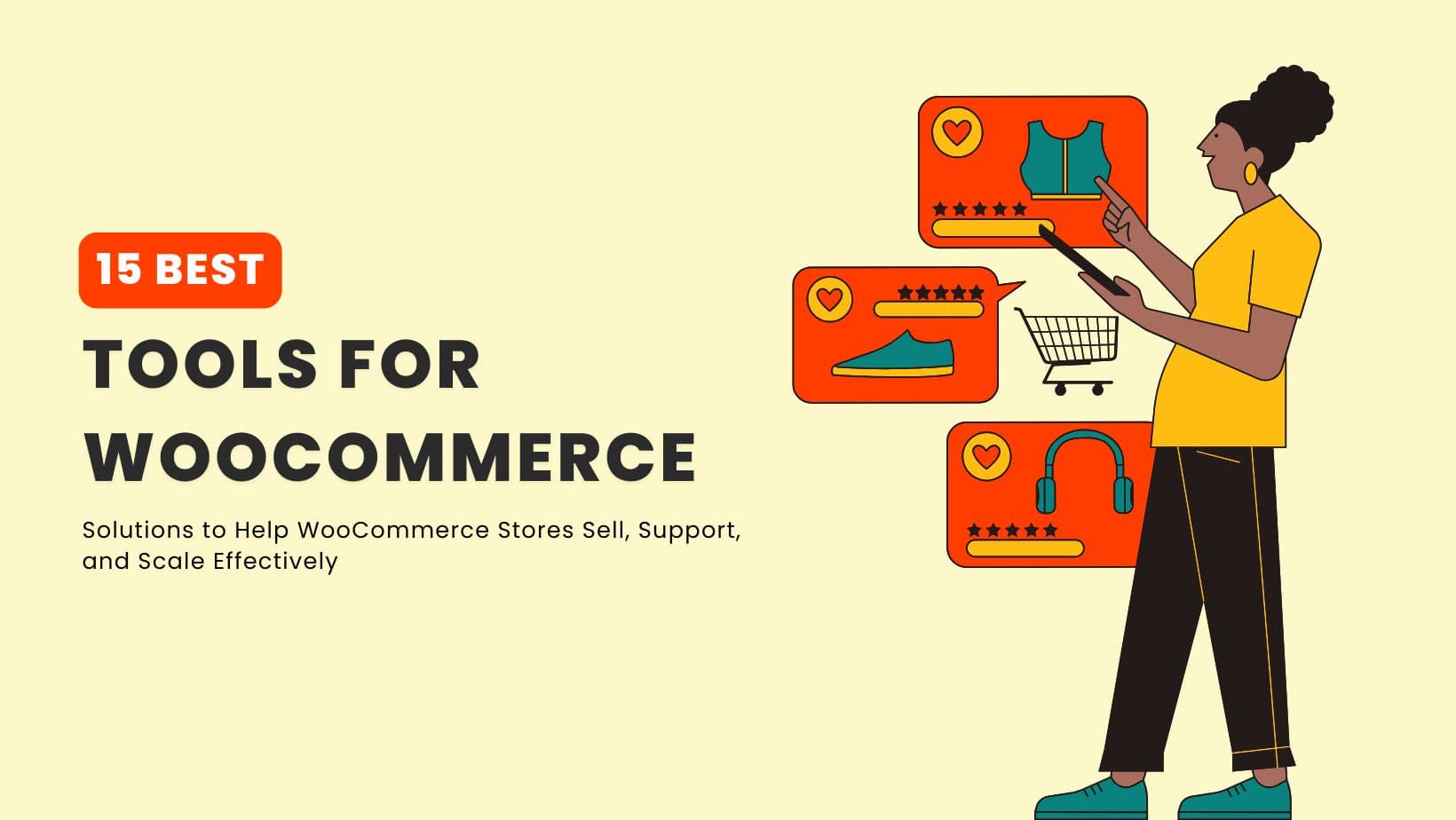
Best 15 Woocommerce Plugins for Your Store in 2026

